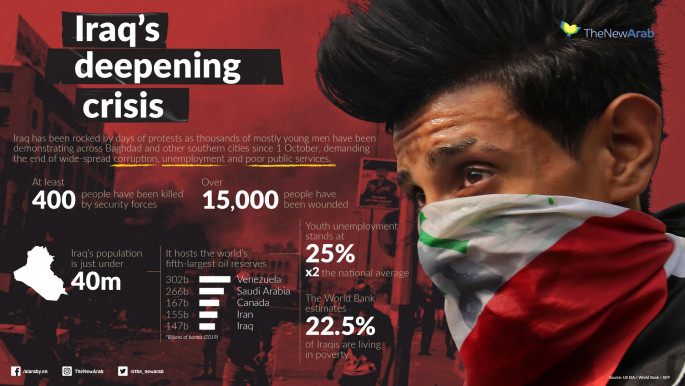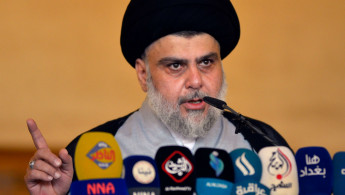Iraqi cleric Muqtada Sadr calls for mass protests against US presence
Sadr is calling on Iraqis to peacefully protest to expel American forces from the country.
2 min read
Sadr is pushing for an end to US intervention in Iraq
Iraqi Shia cleric and political leader Muqtada al-Sadr called Tuesday for a "million-strong march" against the presence of US troops in Iraq, days after parliament voted for their departure following Washington's killing of an Iranian general in a Baghdad drone strike.
"The skies, land and sovereignty of Iraq are being violated every day by occupying forces," the cleric-turned-populist politician wrote on Twitter.
He urged Iraqis to hold "a million-strong, peaceful, unified demonstration to condemn the American presence and its violations", without giving a date.
Though tensions between America and Iran have eased off, as the dust clears it is unclear how the two powerhouses can return to the negotiating table after turbulent weeks.
On 3 January, Trump authorised an airstrike that killed Iranian commander Qasem Soleimani, in an attack that also killed a senior military official.
Read More: The Iraq Report: Iran's power in Iraq now questioned after US kills Soleimani
The Iraqi parliament responded by voting on 5 January to oust foreign forces - including over 5,000 American troops, who have been backing the fight against Islamic State group since 2014.
Iran clapped back by targeting two US bases in Iraq, and though there were no casualties Iraq's president and speaker of parliament condemned Tehran's missile attack on American troops inside Iraq as a "violation of Iraqi sovereignty".
Soleimani's killing also came weeks into mass anti-government demonstrations in Baghdad and the country's south, condemning politicians seen as corrupt, inept and under the sway of both the US and Iran.
The rallies have persisted throughout but shifted to include calls for Iraq to be spared any conflict between Iran and the US.
Iraq has been in political paralysis since the resignation of Prime Minister Adel Abdel Mahdi, with pro- and anti-Iran factions unable to agree on a candidate to form a new government.
Protesters have rejected the possibility of reinstating Abdel Mahdi.
"The people reject that," said Hussin Ali Abdul Hussein, a demonstrator in Karbala, south of the capital. "We don't want to recycle the rubbish, we want a prime minister the public can accept."
The protest movement and the ensuing crackdown by security forces has left around 460 people dead, mostly protesters.
Activists have also faced a campaign of intimidation, abductions and killings.
"The skies, land and sovereignty of Iraq are being violated every day by occupying forces," the cleric-turned-populist politician wrote on Twitter.
He urged Iraqis to hold "a million-strong, peaceful, unified demonstration to condemn the American presence and its violations", without giving a date.
Though tensions between America and Iran have eased off, as the dust clears it is unclear how the two powerhouses can return to the negotiating table after turbulent weeks.
On 3 January, Trump authorised an airstrike that killed Iranian commander Qasem Soleimani, in an attack that also killed a senior military official.
Read More: The Iraq Report: Iran's power in Iraq now questioned after US kills Soleimani
The Iraqi parliament responded by voting on 5 January to oust foreign forces - including over 5,000 American troops, who have been backing the fight against Islamic State group since 2014.
Iran clapped back by targeting two US bases in Iraq, and though there were no casualties Iraq's president and speaker of parliament condemned Tehran's missile attack on American troops inside Iraq as a "violation of Iraqi sovereignty".
Soleimani's killing also came weeks into mass anti-government demonstrations in Baghdad and the country's south, condemning politicians seen as corrupt, inept and under the sway of both the US and Iran.
 |
Iraq has been in political paralysis since the resignation of Prime Minister Adel Abdel Mahdi, with pro- and anti-Iran factions unable to agree on a candidate to form a new government.
Protesters have rejected the possibility of reinstating Abdel Mahdi.
"The people reject that," said Hussin Ali Abdul Hussein, a demonstrator in Karbala, south of the capital. "We don't want to recycle the rubbish, we want a prime minister the public can accept."
The protest movement and the ensuing crackdown by security forces has left around 460 people dead, mostly protesters.
Activists have also faced a campaign of intimidation, abductions and killings.





 Follow the Middle East's top stories in English at The New Arab on Google News
Follow the Middle East's top stories in English at The New Arab on Google News
![The UAE is widely suspected of arming the RSF militia [Getty]](/sites/default/files/styles/image_330x185/public/2024-11/GettyImages-472529908.jpg?h=69f2b9d0&itok=Yauw3YTG)
![Netanyahu furiously denounced the ICC [Getty]](/sites/default/files/styles/image_330x185/public/2024-11/GettyImages-2169352575.jpg?h=199d8c1f&itok=-vRiruf5)
![Both Hamas and the Palestinian Authority welcomed the ICC arrest warrants [Getty]](/sites/default/files/styles/image_330x185/public/2024-11/GettyImages-2178351173.jpg?h=199d8c1f&itok=TV858iVg)